Greatest Albums of All Time (Part 3)
Johnny Cash: At Folsom Prison
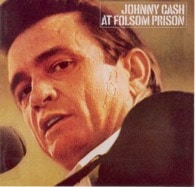 is a live album and 27th overall album by Johnny Cash, released on Columbia Records in May 1968. After his 1955 song “Folsom Prison Blues”, Cash had been interested in recording a performance at a prison. His idea was put on hold until 1967, when personnel changes at Columbia Records put Bob Johnston in charge of producing Cash’s material.
is a live album and 27th overall album by Johnny Cash, released on Columbia Records in May 1968. After his 1955 song “Folsom Prison Blues”, Cash had been interested in recording a performance at a prison. His idea was put on hold until 1967, when personnel changes at Columbia Records put Bob Johnston in charge of producing Cash’s material.
Cash had recently controlled his drug abuse problems, and was looking to turn his career around after several years of limited commercial success. Backed with June Carter, Carl Perkins and the Tennessee Three, Cash performed two shows at Folsom State Prison in California on January 13, 1968. The resulting album consisted of fifteen tracks from the first show and two tracks from the second.
Despite little initial investment by Columbia, the album was a hit in the United States, reaching number one on the country charts and the top 15 of the national album chart. The lead single from the album, a live version of “Folsom Prison Blues”, was a top 40 hit, Cash’s first since 1964’s “Understand Your Man”. At Folsom Prison received positive reviews and revitalized Cash’s career, becoming the first in a series of live albums recorded at prisons that includes “At San Quentin” (1969), “Pa Osteraker” (1973), and “A Concert Behind Prison Walls” (1976). The album was rereleased with additional tracks in 1999 and as a three-disc set in 2008. It was certified three times Platinum on March 27, 2003 by the Recording Industry Association of America for US sales exceeding three million.
Dusty Springfield: Dusty at Memphis
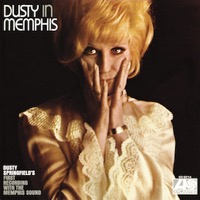 The fifth studio album by English singer Dusty Springfield. She recorded the album at American Sound Studio in Memphis with a team of musicians and producers that included Jerry Wexler, Arif Mardin, Tom Dowd, conductor Gene Orloff, backing vocalists The Sweet Inspirations, bassist Tommy Cogbill, and guitarist Reggie Young. It featured one of her top-10 UK hits, “Son of a Preacher Man”. Although Dusty in Memphis sold poorly when it was first released by Atlantic Records in 1969, the album has since been acclaimed by critics as one of the greatest records of all time and Springfield’s best work. The album received a Grammy award in 2001.
The fifth studio album by English singer Dusty Springfield. She recorded the album at American Sound Studio in Memphis with a team of musicians and producers that included Jerry Wexler, Arif Mardin, Tom Dowd, conductor Gene Orloff, backing vocalists The Sweet Inspirations, bassist Tommy Cogbill, and guitarist Reggie Young. It featured one of her top-10 UK hits, “Son of a Preacher Man”. Although Dusty in Memphis sold poorly when it was first released by Atlantic Records in 1969, the album has since been acclaimed by critics as one of the greatest records of all time and Springfield’s best work. The album received a Grammy award in 2001.
Hoping to reinvigorate her career and boost her credibility, Dusty Springfield turned to the roots of soul music. She signed with Atlantic Records, home label of one of her soul music idols, Aretha Franklin. Although she had sung R&B songs before, she had never released an entire album solely of R&B songs. She began recording an album in Memphis, Tennessee, where some notable blues musicians had grown up. The Memphis sessions at the American Sound Studios were recorded by the A team of Atlantic Records. It included producers Jerry Wexler, Tom Dowd and Arif Mardin, the back-up singers Sweet Inspirations and the instrumental band Memphis Cats, led by guitarist Reggie Young and bassist Tommy Cogbill.
The Memphis Cats had previously backed Wilson Pickett, King Curtis and Elvis Presley. Terry Manning (also a recording engineer, but in this case) a writer for the New Musical Express attended the recording sessions, and ended up assisting Tom Dowd. The songs were written by, among others, Gerry Goffin & Carole King, Barry Mann & Cynthia Weil, Michel Legrand, Randy Newman, and Burt Bacharach & Hal David.
Ray Charles: Modern Sounds in Country and Western Music
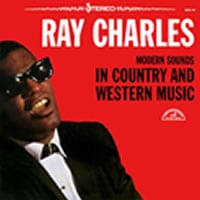 A studio album by American R&B singer-songwriter and musician Ray Charles. It was recorded by Charles in February 1962 at Capitol Studios in New York City and at United Recording Studios in Hollywood, before being released in April of that year by ABC-Paramount Records. The album departed stylistically from the singer’s previous rhythm and blues music. It featured country, folk, and Western music standards reworked by Charles in popular song forms of the time, including R&B, pop, and jazz.
A studio album by American R&B singer-songwriter and musician Ray Charles. It was recorded by Charles in February 1962 at Capitol Studios in New York City and at United Recording Studios in Hollywood, before being released in April of that year by ABC-Paramount Records. The album departed stylistically from the singer’s previous rhythm and blues music. It featured country, folk, and Western music standards reworked by Charles in popular song forms of the time, including R&B, pop, and jazz.
As his fifth LP release for ABC-Paramount, Modern Sounds in Country and Western Music became a rapid critical and commercial success as it brought Ray Charles further mainstream notice, following his tenure for Atlantic Records. With the help of the album’s four charting singles, Charles earned recognition in the pop market, as well as airplay on both R&B and country radio stations. Modern Sounds and its lead single, “I Can’t Stop Loving You”, were both certified gold by the Recording Industry Association of America in 1962, as each record had shipped 500,000 copies in the United States.
Regarded by many critics as Charles’s best studio album, Modern Sounds in Country and Western Music has been considered by several music writers to be a landmark album in American music. The album’s integration of soul and country music bent racial barriers in popular music, amid the height of the Civil Rights Movement. In the process of recording the album, Charles became one of the first African-American musicians to exercise complete artistic control over his own recording career. The album has been called one of the greatest albums of all time by publications such as Rolling Stone and Time.
The Who: Tommy
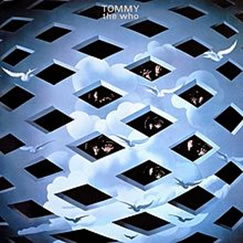 The fourth studio album by the English rock band The Who, a double album first released in May 1969. The album was mostly composed by guitarist Pete Townshend as a rock opera that tells the story about a “deaf, dumb and blind” boy, including his experiences with life and his relationship with his family.
The fourth studio album by the English rock band The Who, a double album first released in May 1969. The album was mostly composed by guitarist Pete Townshend as a rock opera that tells the story about a “deaf, dumb and blind” boy, including his experiences with life and his relationship with his family.
Townshend came up with the concept of Tommy after being introduced to the work of Meher Baba, and attempted to translate Baba’s teachings into music. Recording on the album began in September 1968, but took six months to complete as material needed to be arranged and re-recorded in the studio. Tommy was acclaimed upon its release by critics, who hailed it as the Who’s breakthrough. Its critical standing diminished slightly in later years; nonetheless, several writers view it as an important and influential album in the history of rock music.
The Who promoted the album’s release with an extensive tour, including a live version of Tommy, which lasted throughout 1969 and 1970. Key gigs from the tour included appearances at Woodstock, the 1969 Isle of Wight Festival, the University of Leeds, the Metropolitan Opera House and the 1970 Isle of Wight Festival. The live performances of Tommy drew critical praise and rejuvenated the band’s career.
Diana Ross and The Supremes: Anthology
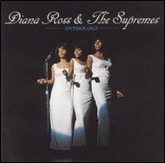 First released in May 1974, is a series of same or similarly titled compilation albums by The Supremes. Motown released revised versions in 1986, 1995 and 2001. In its initial version, a 35-track triple record collection of hits and rare material, the album charted at #24 on Billboard’s “Black Albums” and #66 on “Pop Albums”.
First released in May 1974, is a series of same or similarly titled compilation albums by The Supremes. Motown released revised versions in 1986, 1995 and 2001. In its initial version, a 35-track triple record collection of hits and rare material, the album charted at #24 on Billboard’s “Black Albums” and #66 on “Pop Albums”.
In 2003, Rolling Stone Magazine listed the 2001 version of the album at #431 in its list of “Rolling Stone’s 500 Greatest Albums of All Time”. Without specifying which edition, music journalist Robert Christgau lists the album as part of his recommended “core collection” of albums representing rock music before 1980.
According to Motown data, the 1974 and 1986 releases combined sold over 1,100,000 copies in the USA, while the 1995 edition sold around 125,000 copies. The fourth and final edition released in 2001 managed to sell around 75,000 USA copies.
The Yarbirds: Having a Rave Up With the Yardbirds
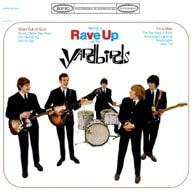 The second American album by English rock group the Yardbirds. It was released in November 1965, eight months after Jeff Beck replaced Eric Clapton on guitar. It includes songs with both guitarists and reflects the group’s blues rock roots and their early experimentations with psychedelic and hard rock.
The second American album by English rock group the Yardbirds. It was released in November 1965, eight months after Jeff Beck replaced Eric Clapton on guitar. It includes songs with both guitarists and reflects the group’s blues rock roots and their early experimentations with psychedelic and hard rock.
The title refers to the driving “rave up” arrangement the band used in several of their songs.
The album contains some of the earliest live recordings with Clapton. Recorded in March 1964, they appeared on the band’s British debut album, Five Live Yardbirds, which was not issused in the United States.
The songs with Beck were recorded in the studio in the months after he joined the group in March 1965. These include several charting singles and introduced “The Train Kept A-Rollin'”, one of the Yardbirds’ most copied arrangements. Although most were not written by the group, the songs became a fixture of the group’s concert repertoire and continued to be performed after Jimmy Page replaced Beck.
The Beatles: Help!
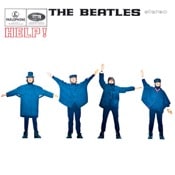 The fifth studio album by English rock band the Beatles, the soundtrack from their film Help!, and released on 6 August 1965. Produced by George Martin, it was the fifth UK album release by the band, and contains fourteen songs in its original British form.
The fifth studio album by English rock band the Beatles, the soundtrack from their film Help!, and released on 6 August 1965. Produced by George Martin, it was the fifth UK album release by the band, and contains fourteen songs in its original British form.
Seven of these, including the singles “Help!” and “Ticket to Ride”, appeared in the film and took up the first side of the vinyl album. The second side contained seven other releases including the most-covered song ever written, “Yesterday”.
The American release was a true soundtrack album, mixing the first seven songs with instrumental material from the film. Of the other seven songs that were on the British release, two were released on the US version of the next Beatles album, Rubber Soul, two were back-to-back on the next US single and then appeared on Yesterday and Today, and three had already been on Beatles VI.
Crosby, Stills, Nash & Young: Déjà vu
 The second album by trio Crosby, Stills & Nash, and their first as a quartet with Neil Young. It was released in March 1970 by Atlantic Records, catalogue SD-7200. It topped the pop album chart for one week and generated three Top 40 singles: “Woodstock”, “Teach Your Children”, and “Our House”. It was rereleased in 1977 as SD-19188 and the cover was changed from black to brown.
The second album by trio Crosby, Stills & Nash, and their first as a quartet with Neil Young. It was released in March 1970 by Atlantic Records, catalogue SD-7200. It topped the pop album chart for one week and generated three Top 40 singles: “Woodstock”, “Teach Your Children”, and “Our House”. It was rereleased in 1977 as SD-19188 and the cover was changed from black to brown.
In 2003, the album was ranked #148 on Rolling Stone magazine’s list of the 500 greatest albums of all time. Certified septuple platinum by RIAA, the album’s sales currently sit at over 8 million copies. It remains the highest-selling album of each member’s career to date.
Déjà Vu was greatly anticipated after the popularity of the first CSN album and given the addition of Neil Young to the group. Stephen Stills estimates that the album took around 800 hours of studio time to record; this figure may be exaggerated, even though the individual tracks display meticulous attention to detail.
The songs, except for “Woodstock”, were recorded as individual sessions by each member, with each contributing whatever was needed that could be agreed upon. Young appears on only half of the tracks, and drummer Dallas Taylor and bassist Greg Reeves are credited on the cover with their names in slightly smaller typeface while Grateful Dead frontman Jerry Garcia plays pedal steel guitar on “Teach Your Children” and former Lovin’ Spoonful leader John Sebastian plays harmonica on the title track.
Four singles were released from the album with all but the last, “Carry On,” charting on the Billboard Hot 100. The song “Country Girl” by Young is a suite put together from three song fragments entitled “Whiskey Boot Hill,” “Down Down Down,” and “Country Girl (I Think You’re Pretty),” and is so identified in the credits.
Simon and Garfunkel: Bridge Over Troubled Water
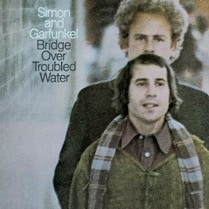 The fifth and final studio album by American folk rock duo Simon & Garfunkel, released in January 1970 on Columbia Records. Following the duo’s soundtrack for The Graduate, Art Garfunkel took an acting role in the film Catch-22, while Paul Simon worked on the songs, writing all tracks except Felice and Boudleaux Bryant’s “Bye Bye Love” (previously a hit for the Everly Brothers).
The fifth and final studio album by American folk rock duo Simon & Garfunkel, released in January 1970 on Columbia Records. Following the duo’s soundtrack for The Graduate, Art Garfunkel took an acting role in the film Catch-22, while Paul Simon worked on the songs, writing all tracks except Felice and Boudleaux Bryant’s “Bye Bye Love” (previously a hit for the Everly Brothers).
With the help of producer Roy Halee, the album followed a similar musical pattern as their Bookends, partly abandoning their traditional style in favor of a more creative sound, combining rock, R&B, gospel, jazz, world music, pop and other genres. After filming Catch-22, Garfunkel returned and the duo recorded around 14 tracks, three of which were not featured in the album. The inclusion of a 12th track was long discussed but they eventually decided upon 11 songs. It was described as both their “most effortless record and their most ambitious.”
Bridge over Troubled Water was released on January 26, 1970, and several re-releases followed. The album was mixed and released in both stereo and quadraphonic. Columbia Records released a 40th Anniversary Edition on March 8, 2011, which includes two DVDs, including the politically themed TV special Songs of America (1969), the documentary The Harmony Game, additional liner notes and a booklet. Other reissues contain bonus tracks, such as the 2001 version, which covers the demo tapes of “Feuilles-O” and “Bridge over Troubled Water”.
Despite numerous accolades, the duo decided to split up, and parted company later in 1970; Garfunkel continued his film career, while Simon worked intensely with music. Both artists released solo albums in the following years. Bridge includes two of the duo’s most critically acclaimed and commercially successful songs, “Bridge over Troubled Water” and “The Boxer”, which were listed on Rolling Stone’s 500 Greatest Songs of All Time. Critically and commercially successful, the album topped the charts in over ten countries and received two Grammy Awards, plus four more for the title song. It sold around 25 million records and was ranked on several lists, including at number 51 on Rolling Stone’s 500 Greatest Albums of All Time.
Aretha Franklin: I Never Loved a Man the way I Love You
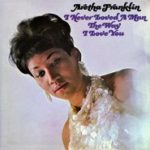 The eleventh studio album by American singer Aretha Franklin.
The eleventh studio album by American singer Aretha Franklin.
Released on March 10, 1967 by Atlantic Records, It went to number 2 on the Billboard album chart and number 1 on the magazine’s Top R&B Selling chart.
It was certified Gold by the RIAA in 1967.
George Harrison: All Things Must Pass
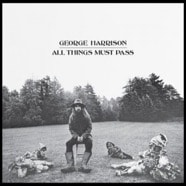 A triple album by English musician George Harrison. Recorded and released in 1970, the album was Harrison’s first solo work since the break-up of the Beatles in April that year, and his third solo album overall.
A triple album by English musician George Harrison. Recorded and released in 1970, the album was Harrison’s first solo work since the break-up of the Beatles in April that year, and his third solo album overall.
It includes the hit singles “My Sweet Lord” and “What Is Life”, as well as songs such as “Isn’t It a Pity” and the title track that had been turned down for inclusion on releases by the Beatles. The album reflects the influence of Harrison’s musical activities with artists such as Bob Dylan, the Band, Delaney & Bonnie and Billy Preston during 1968–70, and his growth as an artist beyond his supporting role to former bandmates John Lennon and Paul McCartney.
All Things Must Pass introduced Harrison’s signature sound, the slide guitar, and the spiritual themes that would be present throughout his subsequent solo work. The original vinyl release consisted of two LPs of songs and a third disc of informal jams, titled Apple Jam. Several commentators interpret Barry Feinstein’s album cover photo, showing Harrison surrounded by four garden gnomes, as a statement on his independence from the Beatles.
Production began at London’s Abbey Road Studios in May 1970, with extensive overdubbing and mixing continuing through October. Among the large cast of backing musicians were Eric Clapton and Delaney & Bonnie’s Friends band – three of whom formed Derek and the Dominos with Clapton during the recording – as well as Ringo Starr, Gary Wright, Preston, Klaus Voormann, John Barham, Badfinger and Pete Drake. The sessions produced a double album’s worth of extra material, most of which remains unissued.
All Things Must Pass was critically and commercially successful on release, with long stays at number 1 on charts around the world. The album was co-produced by Phil Spector and employs his Wall of Sound production technique to notable effect; Ben Gerson of Rolling Stone described the sound as “Wagnerian, Brucknerian, the music of mountain tops and vast horizons”.[1] Reflecting the widespread surprise at the assuredness of Harrison’s post-Beatles debut, Melody Maker’s Richard Williams likened the album to Greta Garbo’s first role in a talking picture and declared: “Garbo talks! – Harrison is free!” According to Colin Larkin, writing in the 2011 edition of his Encyclopedia of Popular Music, All Things Must Pass is “generally rated” as the best of all the former Beatles’ solo albums.
During the final year of his life, Harrison oversaw a successful reissue campaign to mark the 30th anniversary of the album’s release. Following this reissue, in March 2001, the set was certified six-times platinum by the Recording Industry Association of America. Among its appearances in critics’ best-album lists, All Things Must Pass was ranked 79th on The Times’ “The 100 Best Albums of All Time” in 1993, while Rolling Stone currently places it 433rd on the magazine’s “500 Greatest Albums of All Time”.
Cream: Disraeli Gears
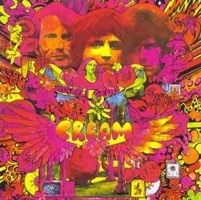 The second studio album by the British rock band Cream. It was released in November 1967 and went on to reach No. 5 on the UK Albums Chart.
The second studio album by the British rock band Cream. It was released in November 1967 and went on to reach No. 5 on the UK Albums Chart.
It was also the group’s American breakthrough, becoming a massive seller in 1968, and reaching No. 4 on the American charts.
The album was No. 1 for two weeks on the Australian album chart and was listed as the No. 1 album of 1968 by Cash Box in the year-end album chart in the United States. The album features the two singles “Strange Brew” and “Sunshine of Your Love”.
Saturday Night Fever
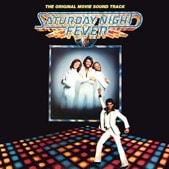 The soundtrack album from the 1977 film Saturday Night Fever starring John Travolta. In the United States, the album was certified 15× Platinum for shipments of at least 15 million units. The album stayed atop the album charts for 24 straight weeks from January to July 1978 and stayed on Billboard’s album charts for 120 weeks until March 1980. In the UK, the album spent 18 consecutive weeks at No. 1. The album epitomized the disco phenomenon on both sides of the Atlantic and was an international sensation. The album has been added to the National Recording Registry in the Library of Congress for being culturally significant.
The soundtrack album from the 1977 film Saturday Night Fever starring John Travolta. In the United States, the album was certified 15× Platinum for shipments of at least 15 million units. The album stayed atop the album charts for 24 straight weeks from January to July 1978 and stayed on Billboard’s album charts for 120 weeks until March 1980. In the UK, the album spent 18 consecutive weeks at No. 1. The album epitomized the disco phenomenon on both sides of the Atlantic and was an international sensation. The album has been added to the National Recording Registry in the Library of Congress for being culturally significant.
